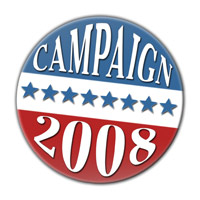Three Alumni Discuss Perceptions of Media Campaign Bias with Chicago Tribune
September 7, 2008
 September 7, 2008, Greencastle, Ind. - "The citizens in a democracy deserve that kind of rigorous, intense reporting when the stakes are as great as they are," Bob Steele, Eugene S. Pulliam Distinguished Visiting Professor of Journalism at DePauw University, tells the Chicago Tribune. "That has nothing to do with ideology," adds Steele, a 1969 graduate of DePauw, who is quoted in a story examining the media coverage of Republican vice presidential nominee Sarah Palin.
September 7, 2008, Greencastle, Ind. - "The citizens in a democracy deserve that kind of rigorous, intense reporting when the stakes are as great as they are," Bob Steele, Eugene S. Pulliam Distinguished Visiting Professor of Journalism at DePauw University, tells the Chicago Tribune. "That has nothing to do with ideology," adds Steele, a 1969 graduate of DePauw, who is quoted in a story examining the media coverage of Republican vice presidential nominee Sarah Palin.
The Tribune's Rex W. Huppke notes that "a Rasmussen poll released Thursday found that 51 percent of Americans believe reporters are trying to hurt Sarah Palin with their coverage and 24 percent say such stories make them more likely to vote for Sen. John McCain in the  election. But many experts believe the mainstream press did nothing wrong in aggressively covering the background of a person in line to be the second most powerful politician in the country."
election. But many experts believe the mainstream press did nothing wrong in aggressively covering the background of a person in line to be the second most powerful politician in the country."
Steele, who also serves as as Nelson Poynter Scholar for Journalism Values at the Poynter Institute, points out that much of the "salacious rumor mongering" the public finds distasteful begins on blogs and Internet chats -- not in mainstream media reports -- but that candidates are put in a position where they are forced to respond publicly and often blast media outlets in the process.
"It really gives the politicians a lot more ammunition to fire back at journalism and to make journalists look like the bad guys, even though much of what's out there isn't journalism," Steele asserts. "The legitimate journalists are in almost a no-win situation. If they don't rigorously scrutinize a candidate for vice president, they will be rightly accused of being incompetent. If they do rigorously scrutinize a candidate, they are accused of being unfair, accused of being sensationalistic, accused of being insensitive to the families."
a candidate, they are accused of being unfair, accused of being sensationalistic, accused of being insensitive to the families."
Huppke notes, "Dating farther back than the days when Teddy Roosevelt first dubbed journalists 'muckrakers,' media bashing has been routine sport in the political arena. Rick Musser, a research professor at the University of Kansas school of journalism, noted that President Richard Nixon turned Vice President Spiro Agnew loose on the press, and Agnew managed to frame reporters as elitists and 'nattering nabobs of negativism' for decades to come." Professor Musser is also a 1969 graduate of DePauw.
The piece also quotes Scott Rasmussen (pictured at right), a 1986 DePauw graduate who is president of Rasmussen Reports, an independent polling company. He says the public's view that media play favorites is deeply ingrained. "If we poll about FOX News there's a perception that they lean to the right. But if we poll against anybody else -- AP, local 
Read the complete text, "Fourth Estate gets third degree," at the Tribune's Web site.
Steele also discussed the media treatment of Governor Palin in this column.
Also accessible are other stories citing Bob Steele, Rick Musser and Scott Rasmussen.
Source: Chicago Tribune
